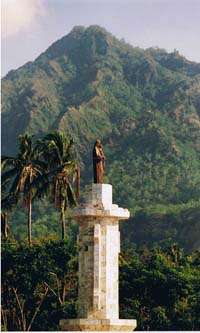Pante Macassar
| Pante Macassar | |
|---|---|
| Town | |
|
Foreshore of Pante Macassar | |
 Pante Macassar Location in East Timor | |
| Coordinates: 9°12′S 124°23′E / 9.200°S 124.383°ECoordinates: 9°12′S 124°23′E / 9.200°S 124.383°E | |
| Country |
|
| District | Oecusse |
| Subdistrict | Pante Makassar Subdistrict |
| Area | |
| • Total | 357.30 km2 (137.95 sq mi) |
| Elevation | 189 m (620 ft) |
| Population (2015 census) | |
| • Total | 12,352 |
| • Density | 35/km2 (90/sq mi) |
| Climate | Aw |

Pante Macassar (also known as Pante Makasar) is a city in Pante Macassar Subdistrict on the north coast of East Timor, 152 km to the west of Dili, the nation's capital. It has a population of 4,730 (Stand 2006). It is the capital of the Oecusse exclave (former Oecussi-Ambeno).
The name literally means "beach of Makasar," alluding to the erstwhile trade with Makasar in Sulawesi (Celebes). Locally Pante Macassar is known also as "Oecussi," which literally means "water cannon," and was the name of one of the two original kingdoms that form the enclave. The other was Ambeno. During the Portuguese colonisation, the city was also known as Vila Taveiro.
Lifau, in the outskirts of the present city, was the place where the Portuguese first disembarked on Timor and was the first capital of Portuguese Timor. It remained the capital until 1769, when it was transferred to Dili because of constant attacks from the Topasses.
Due to its distance from the remainder of East Timor, Oecussi-Ambeno, and specifically Pante Macassar, became the first territory occupied by Indonesia on November 29, 1975.
In 1999, in the tumult that accompanied the referendum for independence, Pante Macassar was particularly affected by the destruction of the pro-integration militias, supported by the Indonesian army. Sixty-five civilian supporters of independence were hanged, and 90 percent of the buildings were burned down.
Today, the city has only a few dozen houses next to a beach with crystal-clear water, surrounded by palms. Crime is practically unknown. The only radio station works only occasionally due to an old transmitter, and electricity is limited to five hours at night. Twice a week, the isolation is briefly interrupted when a ferry boat from Dili arrives, for a journey that takes 12 hours.
